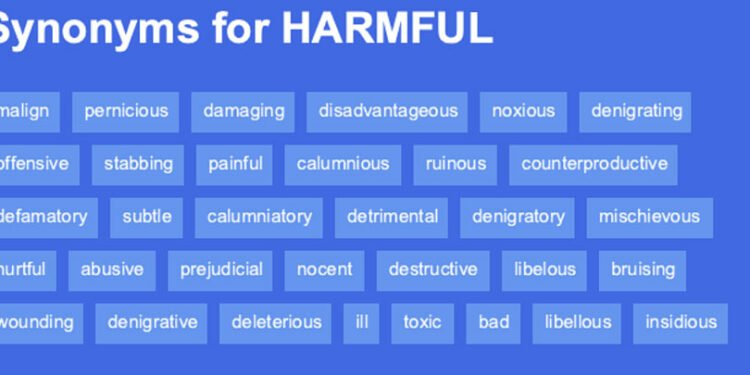Introduction: The Double-Edged Sword of Synonyms
In the quest for eloquent and varied prose, writers frequently turn to synonyms, hoping to enrich their vocabulary and sidestep repetition. While a thesaurus can be an invaluable tool, it also conceals a subtle peril: the “harmful synonym.”
These are words that, despite sharing a core meaning, possess nuances, connotations, or contextual limitations. Their misuse can inadvertently distort a message, confuse a reader, or simply render writing clunky. Grasping this distinction is paramount for truly effective communication.
The Power of Connotation: More Than Just Meaning
Words are seldom neutral; they arrive laden with emotional and cultural associations, known as connotations. While denotation refers to a word’s literal, dictionary definition, connotation adds intricate layers of feeling and implication.
Consider, for instance, “curious” and “nosy.” Both describe an interest in others’ affairs. Yet, “curious” often suggests a healthy inquisitiveness, whereas “nosy” implies an intrusive and unwelcome prying. Similarly, “confident” evokes assurance, while “arrogant” hints at an overbearing self-importance.
Such subtle differences can profoundly alter how a message is received. Selecting a synonym without a keen awareness of its connotation can inadvertently inject an unintended tone or judgment, subtly steering the reader’s perception in an unforeseen direction.
Context is King: Why One Size Doesn’t Fit All
The suitability of a synonym is intrinsically tied to its context. A word that perfectly fits one situation, audience, or tone might prove entirely out of place in another. Astute writers understand that language is a living entity, constantly adapting to its surroundings.
For example, describing a person as “slender” might be a compliment in a fashion context, but labeling them “skinny” could be perceived as derogatory or overly informal. The very same word, deployed in differing contexts, can elicit vastly divergent responses.
This underscores the importance of not merely knowing a word’s definition, but also comprehending its typical usage and the environments in which it naturally flourishes. Recklessly swapping words can result in jarring prose that detracts from the intended message, leaving readers disoriented.
Common Traps of Harmful Synonyms
The Allure of the Ornate
One prevalent pitfall is the temptation to employ overly complex or “fancy” words, believing it will elevate one’s writing. While a rich vocabulary is indeed admirable, replacing clear, concise terms with obscure synonyms often proves counterproductive.
Rather than appearing intelligent, the writing can become convoluted, pretentious, or even nonsensical. Clarity should always reign supreme over ostentation, ensuring the message remains accessible, impactful, and genuinely understood.
The Perils of Technical Terms
Another significant trap involves substituting precise technical terms with more generalized synonyms. Specialized fields frequently rely on specific terminology to convey exact meanings and eliminate ambiguity.
For instance, replacing “carbon footprint” with “carbon impression” or “carbon trace” might seem like a creative flourish, but it strips the term of its established scientific and environmental gravitas. Such substitutions can dilute the intended meaning and erode the credibility of the writing, leading to confusion rather than clarity.
Strategies for Precise Word Choice
To expertly navigate the intricate landscape of synonyms and sidestep their harmful variants, writers can adopt several effective strategies. Firstly, always consult reputable dictionaries and comprehensive usage guides, paying meticulous attention to example sentences and nuanced usage notes.
Secondly, harness the power of corpus linguistics tools. These allow you to observe how words are naturally employed in vast collections of real-world texts, providing invaluable insight into a word’s authentic context and common pairings.
Finally, cultivate a diligent habit of extensive reading across a wide array of genres. Exposure to diverse writing styles and vocabularies naturally sharpens one’s linguistic intuition, making it far easier to discern the subtle distinctions between seemingly similar words. This practice refines your ear for language, guiding you towards more precise and impactful choices that resonate with your audience.
Conclusion: Wielding Words with Wisdom
The journey beyond the simplistic thesaurus reveals that synonyms are not merely interchangeable parts, but rather distinct linguistic instruments, each possessing its own unique character and purpose. Truly effective writing hinges on a profound appreciation for these subtleties.
By understanding the potent force of connotation, respecting the demands of context, and actively avoiding common pitfalls, writers can transform their prose from merely adequate to genuinely compelling. The art of word choice is a continuous process of refinement, a steadfast commitment to precision that ultimately amplifies the clarity and impact of every message. It is about wielding words with wisdom, ensuring that each one serves its purpose with grace, accuracy, and undeniable power.












